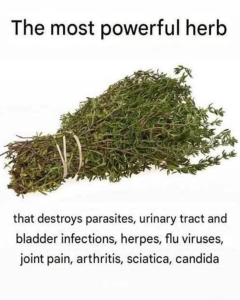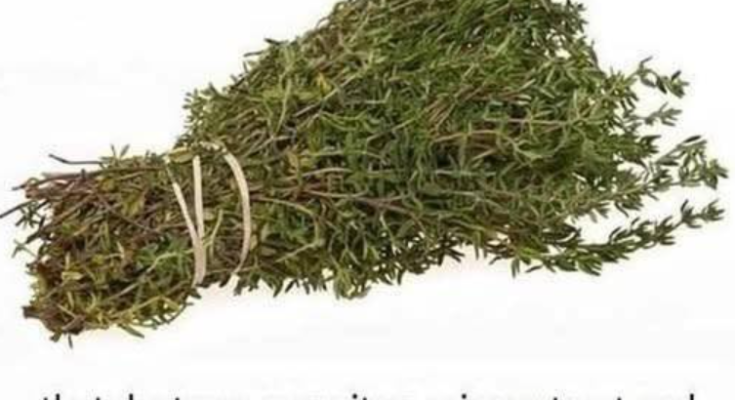The Most Potent Herb That Destroys Parasites
Parasites have been a shadowy presence in human history since the beginning of time. From microscopic organisms that live quietly inside the body to larger worms that can cause visible distress, these unwelcome intruders thrive by feeding off their hosts. For centuries, people have turned to natural remedies—long before pharmaceutical antiparasitic drugs were developed—to cleanse the body of these hidden invaders. Among all the remedies recorded in traditional medicine, one herb consistently rises to the top: wormwood (Artemisia absinthium).
Often referred to as the most potent herb for destroying parasites, wormwood has been both feared and revered across cultures. Its bitter taste and powerful chemical compounds make it effective not only in ridding the body of worms and protozoa, but also in supporting digestive health. Today, it remains one of the most studied and widely used natural antiparasitic herbs in the world.
Why Parasites Are a Global Concern
Before diving into wormwood’s unique power, it helps to understand why parasites matter so much in human health. Despite modern sanitation and medical advances, parasitic infections remain surprisingly common. Millions of people worldwide are affected by roundworms, tapeworms, giardia, and other microscopic organisms.
The symptoms range from mild—bloating, fatigue, skin irritation—to severe conditions involving malnutrition, anemia, and organ damage. Many people may not even realize they’re carrying parasites until symptoms become overwhelming. This is where natural remedies, particularly herbs, have historically played a role: as a preventative and therapeutic approach to cleansing the body.
Wormwood: A Bitter but Powerful Ally
Wormwood is a silvery-green plant native to Europe, Asia, and North Africa, though it now grows around the world. Its name itself hints at its ancient use—“worm-wood” literally describing its ability to expel intestinal worms. In traditional European herbalism, it was one of the most prized remedies for digestive and intestinal complaints.
The bitter compounds in wormwood stimulate the production of stomach acid and bile, creating an environment less hospitable to parasites. But its most notable active chemical is thujone, a compound with strong antimicrobial and antiparasitic properties. While toxic in high amounts, when used carefully under guidance, thujone-containing preparations can target and destroy parasites without harming the host.
How Wormwood Works Against Parasites
Scientific studies have increasingly backed what folk medicine has known for centuries. Wormwood works in several ways:
-
Disrupting Parasite Nervous Systems
Compounds in wormwood, including thujone and sesquiterpene lactones, interfere with the nervous systems of parasitic worms, essentially paralyzing them and making it easier for the body to expel them. -
Destroying Protozoa
Wormwood has also shown activity against protozoan parasites such as Giardia lamblia and Plasmodium (the malaria parasite). This is one reason wormwood derivatives have been used in modern antimalarial drugs. -
Stimulating Digestion
By increasing stomach acid and bile, wormwood enhances digestion and creates a hostile environment for parasites that thrive in sluggish or weakened digestive tracts. -
Synergy With Other Herbs
Wormwood is often paired with black walnut hulls and cloves. Together, this “antiparasitic trio” targets parasites in different stages of life—black walnut kills adult parasites, wormwood attacks larvae, and cloves destroy eggs.
Historical and Cultural Use
The power of wormwood is not new knowledge. Cultures across the globe have recognized its potency:
-
Ancient Egypt: Wormwood was used in medicinal infusions for intestinal complaints.
-
Greek & Roman Medicine: Hippocrates and Pliny the Elder praised wormwood for its digestive benefits and its ability to drive out worms.
-
European Folk Medicine: Families often brewed wormwood teas during seasonal cleanses, especially after feasts, when intestinal worms were more likely to proliferate.
-
Chinese Medicine: Related species such as Artemisia annua (sweet wormwood) became famous for their malaria-fighting properties.
Wormwood even made its way into folklore and superstition. It was often carried as a protective charm or burned to purify spaces believed to be infested with malevolent forces—both literal parasites and spiritual ones.
Benefits Beyond Parasite Cleansing
While its antiparasitic powers are most celebrated, wormwood offers additional benefits:
-
Digestive Aid: Its bitter taste stimulates appetite and helps with indigestion.
-
Anti-inflammatory: Some compounds in wormwood may reduce inflammation in the gut.
-
Antimicrobial: It has activity against bacteria and fungi as well, making it a broader cleanser.
-
Mood and Clarity: Historically, wormwood was used in small amounts in beverages like absinthe, believed to sharpen the mind (though abuse led to its controversial reputation).
Caution and Safe Use
As powerful as wormwood is, it is not without risks. The same compounds that make it potent can also be toxic in high doses. Here are important safety notes:
-
Thujone Toxicity: Large amounts can cause seizures or neurotoxicity.
-
Pregnancy Warning: Wormwood should never be used during pregnancy, as it may stimulate uterine contractions.
-
Dosage Matters: Wormwood is best used in controlled tinctures, capsules, or teas, under professional guidance.
-
Short-Term Use Only: It is not meant for long-term daily use but rather for cleansing periods of a few weeks.
Anyone considering wormwood as an antiparasitic should consult a healthcare professional, especially if they have preexisting conditions or are taking medications.
Modern Perspectives
Today, wormwood remains a bridge between traditional wisdom and modern science. Its derivative, artemisinin, extracted from a close relative (Artemisia annua), has revolutionized malaria treatment worldwide and earned a Nobel Prize in 2015. This demonstrates that nature’s remedies still hold untapped potential, even in an age of pharmaceutical innovation.
In natural health circles, wormwood continues to be used in parasite cleanses, digestive bitters, and detox protocols. For those who prefer herbal medicine, it represents one of the strongest allies against parasites—effective, time-tested, and rooted in centuries of human experience.
Final Thoughts
Parasites may be ancient adversaries, but so are the herbs that fight them. Among all the natural remedies available, wormwood stands out as the most potent herb for destroying parasites. Its bitter compounds, antimicrobial properties, and ability to disrupt parasite life cycles make it a powerful cleansing agent when used responsibly.
For those seeking natural ways to maintain intestinal health, wormwood offers both a link to traditional medicine and a scientifically validated solution. Yet its potency demands respect—it should never be used casually or excessively.
In the end, wormwood is a reminder of nature’s dual power: healing and harm, depending on how wisely we approach it. Used with knowledge and care, it remains humanity’s most enduring herbal weapon against the hidden world of parasites.
The Most Potent Herb That Destroys Parasites
Parasites have been a shadowy presence in human history since the beginning of time. From microscopic organisms that live quietly inside the body to larger worms that can cause visible distress, these unwelcome intruders thrive by feeding off their hosts. For centuries, people have turned to natural remedies—long before pharmaceutical antiparasitic drugs were developed—to cleanse the body of these hidden invaders. Among all the remedies recorded in traditional medicine, one herb consistently rises to the top: wormwood (Artemisia absinthium).
Often referred to as the most potent herb for destroying parasites, wormwood has been both feared and revered across cultures. Its bitter taste and powerful chemical compounds make it effective not only in ridding the body of worms and protozoa, but also in supporting digestive health. Today, it remains one of the most studied and widely used natural antiparasitic herbs in the world.
Why Parasites Are a Global Concern
Before diving into wormwood’s unique power, it helps to understand why parasites matter so much in human health. Despite modern sanitation and medical advances, parasitic infections remain surprisingly common. Millions of people worldwide are affected by roundworms, tapeworms, giardia, and other microscopic organisms.
The symptoms range from mild—bloating, fatigue, skin irritation—to severe conditions involving malnutrition, anemia, and organ damage. Many people may not even realize they’re carrying parasites until symptoms become overwhelming. This is where natural remedies, particularly herbs, have historically played a role: as a preventative and therapeutic approach to cleansing the body.
Wormwood: A Bitter but Powerful Ally
Wormwood is a silvery-green plant native to Europe, Asia, and North Africa, though it now grows around the world. Its name itself hints at its ancient use—“worm-wood” literally describing its ability to expel intestinal worms. In traditional European herbalism, it was one of the most prized remedies for digestive and intestinal complaints.
The bitter compounds in wormwood stimulate the production of stomach acid and bile, creating an environment less hospitable to parasites. But its most notable active chemical is thujone, a compound with strong antimicrobial and antiparasitic properties. While toxic in high amounts, when used carefully under guidance, thujone-containing preparations can target and destroy parasites without harming the host.
How Wormwood Works Against Parasites
Scientific studies have increasingly backed what folk medicine has known for centuries. Wormwood works in several ways:
-
Disrupting Parasite Nervous Systems
Compounds in wormwood, including thujone and sesquiterpene lactones, interfere with the nervous systems of parasitic worms, essentially paralyzing them and making it easier for the body to expel them. -
Destroying Protozoa
Wormwood has also shown activity against protozoan parasites such as Giardia lamblia and Plasmodium (the malaria parasite). This is one reason wormwood derivatives have been used in modern antimalarial drugs. -
Stimulating Digestion
By increasing stomach acid and bile, wormwood enhances digestion and creates a hostile environment for parasites that thrive in sluggish or weakened digestive tracts. -
Synergy With Other Herbs
Wormwood is often paired with black walnut hulls and cloves. Together, this “antiparasitic trio” targets parasites in different stages of life—black walnut kills adult parasites, wormwood attacks larvae, and cloves destroy eggs.
Historical and Cultural Use
The power of wormwood is not new knowledge. Cultures across the globe have recognized its potency:
-
Ancient Egypt: Wormwood was used in medicinal infusions for intestinal complaints.
-
Greek & Roman Medicine: Hippocrates and Pliny the Elder praised wormwood for its digestive benefits and its ability to drive out worms.
-
European Folk Medicine: Families often brewed wormwood teas during seasonal cleanses, especially after feasts, when intestinal worms were more likely to proliferate.
-
Chinese Medicine: Related species such as Artemisia annua (sweet wormwood) became famous for their malaria-fighting properties.
Wormwood even made its way into folklore and superstition. It was often carried as a protective charm or burned to purify spaces believed to be infested with malevolent forces—both literal parasites and spiritual ones.
Benefits Beyond Parasite Cleansing
While its antiparasitic powers are most celebrated, wormwood offers additional benefits:
-
Digestive Aid: Its bitter taste stimulates appetite and helps with indigestion.
-
Anti-inflammatory: Some compounds in wormwood may reduce inflammation in the gut.
-
Antimicrobial: It has activity against bacteria and fungi as well, making it a broader cleanser.
-
Mood and Clarity: Historically, wormwood was used in small amounts in beverages like absinthe, believed to sharpen the mind (though abuse led to its controversial reputation).
Caution and Safe Use
As powerful as wormwood is, it is not without risks. The same compounds that make it potent can also be toxic in high doses. Here are important safety notes:
-
Thujone Toxicity: Large amounts can cause seizures or neurotoxicity.
-
Pregnancy Warning: Wormwood should never be used during pregnancy, as it may stimulate uterine contractions.
-
Dosage Matters: Wormwood is best used in controlled tinctures, capsules, or teas, under professional guidance.
-
Short-Term Use Only: It is not meant for long-term daily use but rather for cleansing periods of a few weeks.
Anyone considering wormwood as an antiparasitic should consult a healthcare professional, especially if they have preexisting conditions or are taking medications.
Modern Perspectives
Today, wormwood remains a bridge between traditional wisdom and modern science. Its derivative, artemisinin, extracted from a close relative (Artemisia annua), has revolutionized malaria treatment worldwide and earned a Nobel Prize in 2015. This demonstrates that nature’s remedies still hold untapped potential, even in an age of pharmaceutical innovation.
In natural health circles, wormwood continues to be used in parasite cleanses, digestive bitters, and detox protocols. For those who prefer herbal medicine, it represents one of the strongest allies against parasites—effective, time-tested, and rooted in centuries of human experience.
Final Thoughts
Parasites may be ancient adversaries, but so are the herbs that fight them. Among all the natural remedies available, wormwood stands out as the most potent herb for destroying parasites. Its bitter compounds, antimicrobial properties, and ability to disrupt parasite life cycles make it a powerful cleansing agent when used responsibly.
For those seeking natural ways to maintain intestinal health, wormwood offers both a link to traditional medicine and a scientifically validated solution. Yet its potency demands respect—it should never be used casually or excessively.
In the end, wormwood is a reminder of nature’s dual power: healing and harm, depending on how wisely we approach it. Used with knowledge and care, it remains humanity’s most enduring herbal weapon against the hidden world of parasites.


